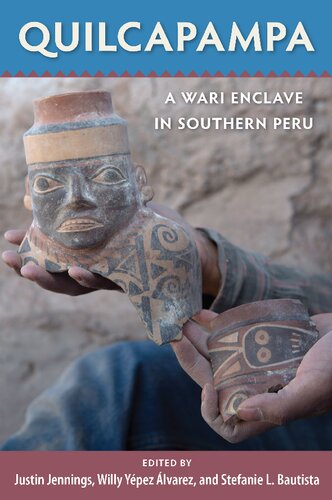

Most ebook files are in PDF format, so you can easily read them using various software such as Foxit Reader or directly on the Google Chrome browser.
Some ebook files are released by publishers in other formats such as .awz, .mobi, .epub, .fb2, etc. You may need to install specific software to read these formats on mobile/PC, such as Calibre.
Please read the tutorial at this link: https://ebookbell.com/faq
We offer FREE conversion to the popular formats you request; however, this may take some time. Therefore, right after payment, please email us, and we will try to provide the service as quickly as possible.
For some exceptional file formats or broken links (if any), please refrain from opening any disputes. Instead, email us first, and we will try to assist within a maximum of 6 hours.
EbookBell Team

4.4
22 reviewsIn the ninth century AD, settlers from the heartland of the Wari Empire founded Quilcapampa, a short-lived site overlooking the Sihuas River in southern Peru. The contributors to this volume present excavation and survey data from in and around Quilcapampa that challenge long-held models of both Wari statecraft and the mechanisms that engendered the widespread societal changes of the era.
Quilcapampa and other peripheral Wari settlements have generally been seen as local administrative centers that siphoned resources from conquered regions to the Wari capital. This volume demonstrates that Quilcapampa was likely founded not by Wari officials but by families looking for a new home amid the turmoil caused by increasing Wari political centralization. Botanical, faunal, ceramic, lithic, and other data sets are used to reconstruct lifeways at the site and show how the settlers interacted with others locally and across greater distances.
Featuring extensive illustrations in the print edition and multimedia components in the digital edition, Quilcapampa offers an abundance of archaeological data on the site as well as new theoretical considerations of Wari expansion, laying the foundation for a better understanding of how Andean political economy and social complexity changed over time.
Contributors: Aleksa Alaica Stefanie Bautista Stephen Berquist Matthew E. Biwer Luis Manuel González La Rosa Felipe Gonzalez-Macqueen Oscar Huamán López Justin Jennings Mallory A. Melton Patricia Quiñonez Cuzcano David Reid Branden Rizzuto Giles Spence-Morrow Willy Yépez Álvarez.